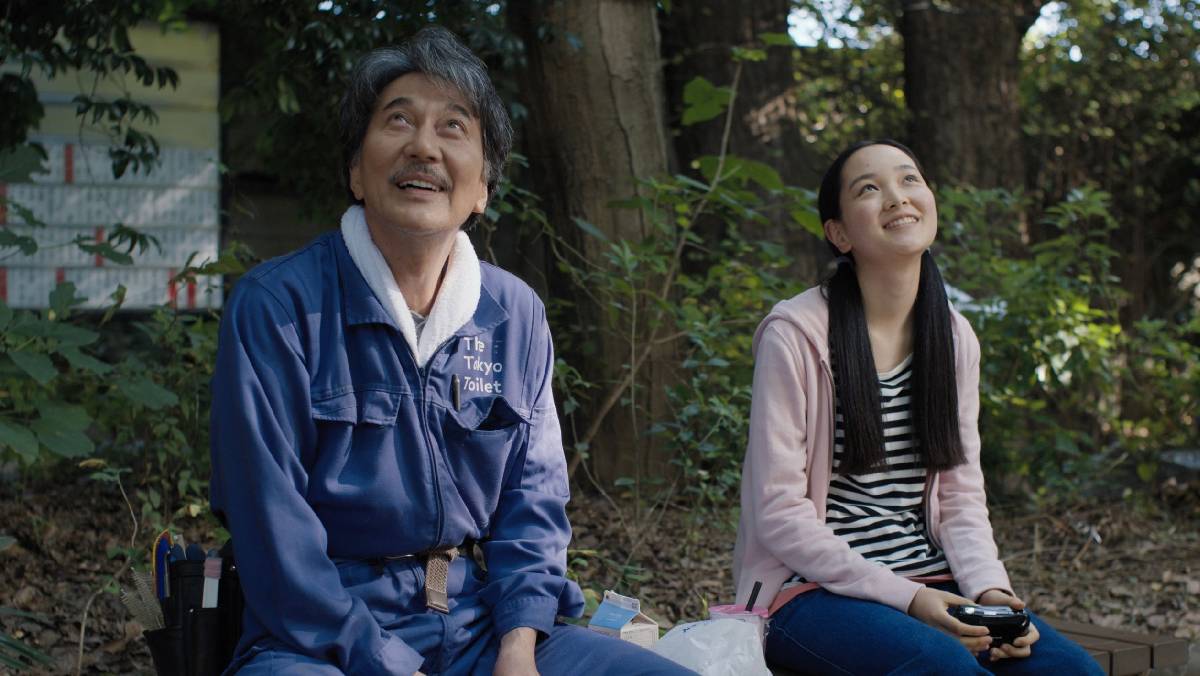4.0 out of 5.0 stars
On any given day, Hirayama (Koji Yakusho) wakes up to the sound of a woman sweeping the street outside his living space. He shaves his beard, gets a drink from a vending machine and drives to work as a toilet cleaner while listening to his favorite cassette tapes. He observes the Tokyo architecture around him and the sun rising — the small things around him that might otherwise be overlooked in the capitalist chaos of day-to-day life.
When Hirayama’s niece, Niko (Arisa Nakano), runs away from her mother to stay with Hirayama, he finds solace and connection despite his family’s complete disconnect from his lifestyle. Short dream sequences scattered throughout the film provide further insight into Hirayama’s past and what he truly values in life.
Esteemed director Wim Wenders’ naturalistic style invites the audience to fall into Hirayama’s everyday pattern and take in everything that Hirayama himself is drawn to. There is no big disruption or event in NEON’s “Perfect Days,” released on Feb. 7: only reflection and the natural beauty found in nearby places. The slower pace of the film may draw some away, but audiences willing to let the film wash over them will be surely rewarded throughout.
Hirayama doesn’t speak for about half of the film, which is a recurring theme from the protagonist in Wenders’ heartbreaking 1984 masterpiece “Paris, Texas.” This choice in writers Wenders and Takuma Takasaki’s simple but beautiful script makes it all the more effective and meaningful when Hirayama finally does speak. Who he speaks to versus who he doesn’t is indicative of the importance of creating space for the people who genuinely make the effort to connect with others.
On the surface, “Perfect Days” is a film about taking a step back to embrace life as it comes, whether that be looking up to see leaves swaying on a tree or slowly sifting through a bookstore. Wenders clearly wants this to be a major takeaway for the audience. The true highlight, however, is found in what Wenders has to say about the ways we catalog memories and the constant push and pull in society between modernization while reminiscing and making space for the past.
There’s a real tangible quality that the viewer can feel in the collections of photographs that Hirayama keeps with him. The time Hirayama spends with Niko specifically illustrates how different generations of people can come together to share and capture moments. At a park, Niko and Hirayama both take pictures of the same tree — Niko on her phone and Hirayama on his old camera. While the specific devices both characters use are from completely different time periods, they are still able to share the moment together.
One of the most memorable scenes in the film follows when Hirayama’s talkative co-worker, Takashi (Tokio Emoto), tries to convince Hirayama to sell some of his old cassette tapes from the 70s and 80s. The store owner even goes on to explain that 70s and 80s cassettes are “in” now, making them incredibly profitable. What Takashi can’t comprehend is the memories, stories and laughter that those cassettes bring to Hirayama and so many people around the world. The unfortunate commodification of artifacts from decades past and the importance of preserving people’s personal connection to physical media is a central theme in “Perfect Days.”
Of course, none of Wenders’ gorgeous vision would be possible without the tremendous Cannes-winning work from Yakusho in bringing Hirayama to life so authentically. When he doesn’t speak, Yakusho’s facial expressions and mannerisms still keep the viewer right alongside him throughout his entire journey. Nakano’s performance as Niko is another highlight — two subtle performances that, without a doubt, deserved more recognition from awards bodies.
In addition to being a gently effective character study, Wenders’ film also quietly comments on the way public service workers are often made to feel invisible. Despite the disapproval of Niko’s mom, Keiko (Yumi Asō), Hirayama is never pessimistic about his job. While the general public almost never looks directly at Hirayama, their viewpoint doesn’t weigh down on him. He simply doesn’t give those people his energy. He always finds a way to love his work.
“Perfect Days” may not necessarily provide a groundbreaking perspective on life, but the straightforward plot is exactly the point. Life is often complicated, scary and so many different things. But sometimes it’s as simple as listening to your favorite song and remembering a fond memory that makes you smile. And sometimes, it should be that simple.





















